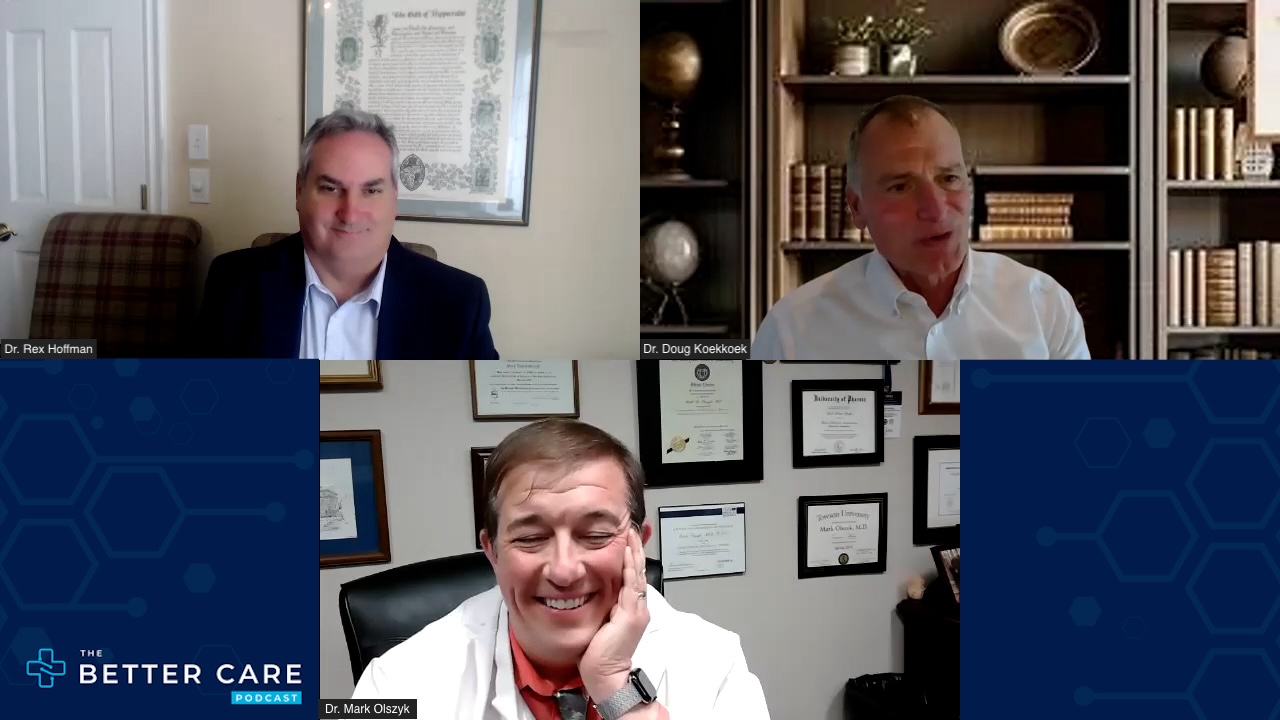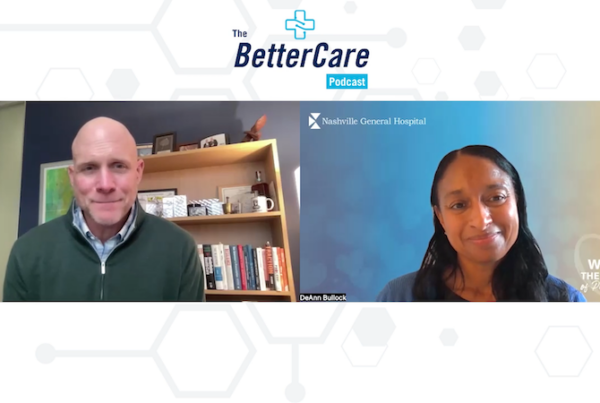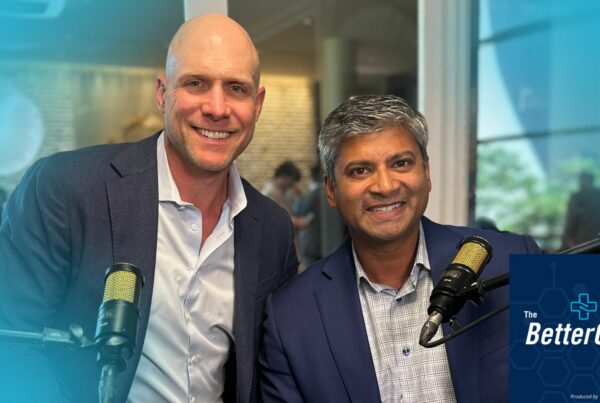For physicians contemplating a transition into leadership, the journey to becoming a Chief Medical Officer (CMO) is filled with pivotal moments – each requiring strategic decision-making, self-reflection, and skill development. In a recent episode of The Better Care Podcast, three seasoned CMOs, Dr. Rex Hoffman, Dr. Doug Koekkoek, and Dr. Mark Olszyk, discuss the timeline of stepping into a CMO role, from initial consideration to the first year in the position.
From his book, I Want to Be a Chief Medical Officer. Now What?, Dr. Hoffman provides a structured approach to understanding the steps and challenges of this transition. This blog follows that framework, offering insights on key phases of the journey. Whether you’re preparing for your first CMO role or want to brush up on your leadership skills for a new CMO role, these insights will help guide your path forward.
Some quotes have been lightly edited for clarity and brevity.
Ep 24 – How to Be a Successful Hospital CMO – Dr. Rex Hoffman (Providence)
When Is the Right Time to Become a CMO?
For many physicians, the idea of transitioning into an administrative role emerges after years of clinical experience. But how do you know if you’re truly ready? According to Dr. Koekkoek, this decision requires a mix of practical experience and deep self-reflection.
“Not all CMO jobs are the same,” he explains. If you’re considering a hospital CMO role, do you have experience with medical staff affairs—understanding how the MEC (Medical Executive Committee) works, how to conduct peer reviews, how hospital committees function?”
Beyond experience, physicians must ask themselves if they are ready to leave full-time clinical practice. The immediate gratification of treating patients shifts to a long-term impact on hospital systems and patient care.
“Being a physician is a lot of our identity,” Dr. Koekkoek notes. “CMO work is different—you’re improving care at scale, but you lose the daily hands-on clinical impact.”
CMOs also need to consider work-life balance. While clinical work often comes with structured schedules and predictable patient loads, administrative roles can require unpredictable hours, responding to crises, and handling organizational challenges that stretch beyond traditional workdays. Understanding these trade-offs is critical in determining whether the transition is right for you.
Preparing for the Interview Process
Once a physician decides to pursue a CMO role, the next step is preparing for the interview. Dr. Olszyk emphasizes the importance of research and networking.
“Find out as much as you can about the job and the organization,” he advises. “Call CMOs at nearby hospitals, ask about their experiences, and make sure the role is the right fit for you.”
Candidates should conduct thorough research about the hospital’s leadership structure, financial health, quality metrics, and strategic goals. Understanding the specific challenges facing the institution allows applicants to tailor their responses and demonstrate how they can contribute effectively.
Additionally, he stresses the importance of understanding hospital politics and operations.
“Knowing how to prepare for Joint Commission visits, understanding hospital quality metrics, and being familiar with medical staff governance are critical competencies for any CMO candidate.” -Dr. Olszyk
Another key factor in preparation is understanding what interviewers are looking for.
“It’s not just about your resume,” Dr. Olszyk explains. “You need to demonstrate leadership, problem-solving abilities, and the willingness to collaborate across departments.”
The First 90 Days: Building Trust and Gathering Information
Once hired, the first 90 days are crucial in setting the tone for success. Dr. Koekkoek advises new CMOs to spend this time asking questions and absorbing information.
“Your first 90 days are the best opportunity you’ll ever have to ask dumb questions,” he says. “People don’t know you yet, so expectations are lower. Use this time to visit every department, meet with stakeholders, and understand the hospital’s current performance in quality, safety, and finance.”
Dr. Olszyk adds that relationship-building is just as important as operational knowledge.
“You need to meet your CEO, medical staff leadership, department chairs, nursing executives, and even the hospital attorney,” he explains. “Developing these relationships early will make your job easier when challenges arise.”
Beyond meetings, new CMOs should engage in hospital rounds, actively listening to concerns from frontline staff. Understanding the pain points of different departments can provide invaluable context for future decision-making. Additionally, reviewing past performance reports, accreditation records, and patient satisfaction surveys can offer insights into where the organization is excelling and where improvements are needed.
The First Year: Establishing Leadership
While the first 90 days are about learning, the first year is about execution. Dr. Olszyk encourages CMOs to focus on defining success with their leadership team.
“Ask your CEO: ‘One year from now, what will make me a successful CMO in your eyes?’” he suggests. “Understanding their priorities ensures that your efforts align with organizational goals.”
He also warns against common pitfalls, such as overcommitting too soon or aligning too closely with certain hospital factions.
“Don’t make hasty decisions. Spend your first year identifying the hospital’s real power structures—not just those on the org chart. And be careful about forming cliques or over-confiding in colleagues internally; seek mentorship outside the organization instead.” – Dr. Olszyk
Building a long-term strategy during the first year is key. New CMOs should focus on key system initiatives, such as improving patient outcomes, enhancing hospital efficiency, and strengthening physician engagement. It’s also important to set measurable goals and track progress, ensuring that leadership efforts lead to tangible improvements.
Final Advice for Aspiring CMOs
-
- Gain leadership experience early: Get involved in hospital committees, mentorship programs, and operational initiatives to build your leadership skills before stepping into a CMO role.
- Assess your readiness and the organization’s structure: Not all CMO roles are the same—understand expectations, reporting structures, and support systems before transitioning.
- Build a strong support system: Having mentors and a trusted network is critical for success in this often-isolating role.
- Stay flexible and resilient: CMOs must be prepared to navigate complex challenges and drive meaningful improvements while staying aligned with the health system’s mission.
For a deeper dive into the role of a CMO, check out I Want to Be a Chief Medical Officer. Now What? by Dr. Rex Hoffman.
To hear the full discussion, listen to the latest episode of The Better Care Podcast featuring Dr. Hoffman, Dr. Koekkoek, and Dr. Olszyk.









